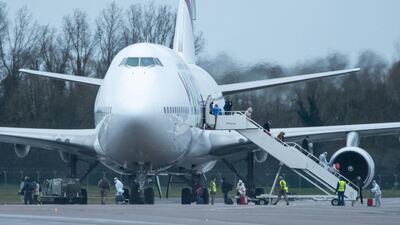Private jet inquiries have surged in the wake of the coronavirus outbreak, operators say.
The start of the Covid-19 outbreak in Wuhan prompted airlines to reduce or cease flights to and from China this month to stem its spread to other countries.
That led wealthy Chinese families, including some holidaying in the UAE, to contact private jet operators to help them return home.
But brokers were unable to fulfil bookings, in part due to a reluctance among operators to lease their aircraft.
“In the initial stages we were getting inquiries,” said Jobby George, general manager for the Middle East at Air Partner.
The company organised two charter flights to fly 325 British citizens from Wuhan.
“The inquiries were mainly from Chinese nationals who were already out of China for Chinese new year.
"When airlines began restricting travel to China they started panicking about how they would get back there. We were unable to fulfil them as the majority of the operators didn’t want to send their crews or planes to the area.”
Mr George said the company received six inquiries from Chinese families on holiday in the UAE in late January.
They flew home with Emirates and Etihad, which continue to fly to China’s capital, Beijing.
“Our major impact was that we were working on a few inquiries for March, especially to the Far East," he said.
“But the clients came back to say they were not planning to go ahead because of the current situation. They didn’t want to expose themselves. They are planning to prolong their trips until July for the long summer holiday.”
Other operators said they were also unable to confirm any bookings due to flight restrictions, despite significant interest.
Logan Ravishankar, chief executive of Singapore-based charter operator MyJet Asia, told The National the company received many inquiries from Chinese families.
“But we couldn’t do any charters. We had a few problems. First of all, the planes could not enter certain places in China,” he said.
Planes that could enter China would not be allowed to return to countries that banned aircraft coming from China.
“They couldn’t go back to the places where they would normally base their aircraft,” he said.
“The largest operators were very scared to lease their aircraft and most of the crew didn’t want to fly.”
There were no restrictions during the Sars outbreak in 2003, Mr Ravishankar said.
The number of flights scheduled to operate to, from and within China dropped by 34 per cent from January 23 through to February 11, according to UK-based consultancy Ascend by Cirium.
Dozens of airlines have cancelled either all or some flights to China until as late as the end of April.
On February 5, the UAE announced the suspension of several routes between the Emirates and China until further notice. Etihad and Emirates continue to fly to Beijing but passengers travelling from Beijing International Airport must undergo a comprehensive medical screening, of between six to eight hours, at the airport under the General Civil Aviation Authority rules.
Further medical tests are conducted on arrival.
A spokesman for Abu Dhabi Airports said thermal scans were carried out on passengers arriving from Beijing aboard the aircraft, prior to disembarking. Passengers are also swabbed to check for the virus after they disembark and before they enter the UAE.


